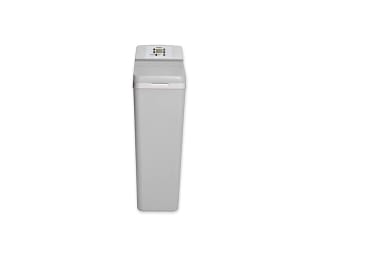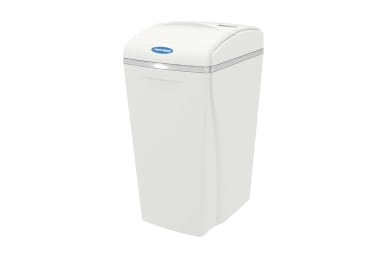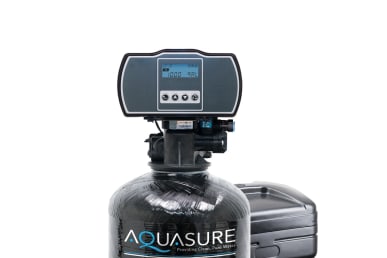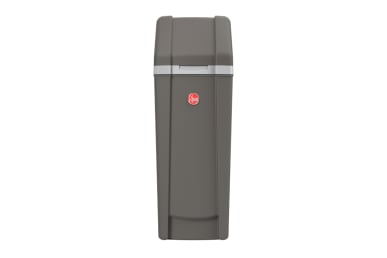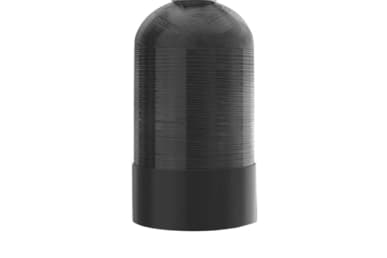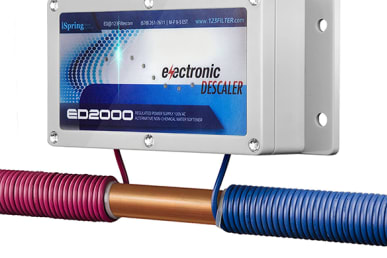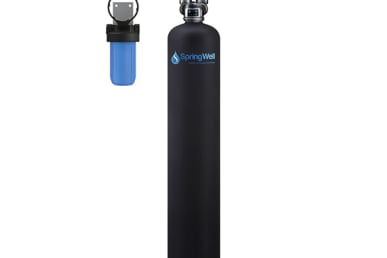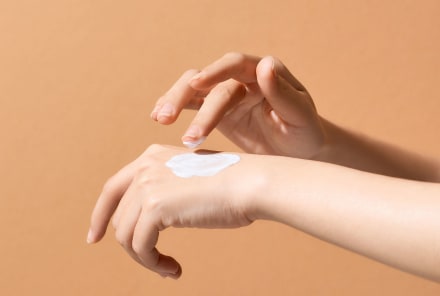Advertisement
7 Best Water Softeners + How To Know If Your Water Is Hard


Have you ever unloaded your dishwasher only to find that your drinking glasses are covered in spots? Maybe you often feel a slimy residue on your hands post-wash or your hair feels unusually dry or brittle.
These could all be signs of hard water—which is not only annoying but can also cause serious damage to your appliances and plumbing. The best water softeners can save your plumbing (and your sanity), by prolonging the life of your pipes, softening your hair and skin, and helping you feel cleaner after every shower.
The U.S. Geological Survey estimates that 85% of the country has hard water, and while drinking hard water won't kill you, bathing in it isn't great for your skin or your hair.
Keep scrolling to learn more about hard water and the benefits of a water softener and to see our picks for the best water softeners.
The best water softeners:
What is hard water?
Does the H2O from your tap come out cloudy? You can thank hard water. How "hard" your water is depends on the amount of dissolved minerals—namely calcium and magnesium—it contains. As water passes through soil and rock, it picks up these minerals along the way. The harder the water, the more minerals it has.
"These minerals can form a layer on the skin, causing dryness and itchiness, and exacerbating existing skin conditions such as eczema and psoriasis," says Brian Campbell, founder and chief water treatment expert at WaterFilterGuru.com. "When we shower in hard water, the calcium and magnesium buildup on our hair causes it to become dry and brittle and the color to fade."
Hard water also wreaks havoc on your home. The residue left behind by these minerals can reduce the life span of your appliances, clog your pipes, and even increase the cost of heating water.
What is a water softener?
A water softener is a device that removes minerals from hard water. There are a few methods water softeners use, but Campbell says the three most common are:
Salt-based ion exchange softeners: These work by exchanging the hardness minerals in water (primarily calcium and magnesium) for small amounts of sodium. According to Campbell, salt-based softeners are ideal for excessively hard water, such as well water.
Salt-free water conditioners: Salt-free water conditioners work by crystallizing the minerals in your water and preventing them from sticking to surfaces.
Electromagnetic descalers: These water softeners alter the chemical structure of the minerals so they can't adhere to surfaces.
By installing a water softener in your home, you can increase the efficiency of your pipes and water-based appliances and even reduce the time it takes to heat up your water. Campbell reiterates that softer water is also beneficial for smoother skin and stronger, healthier-looking hair and can help your dishes come through the wash actually looking clean.
When your pipes are flowing with soft water, suddenly everything is better. Soap and shampoo lather more easily, and laundry feels softer to the touch. Making the swap is a simple way to elevate your everyday routine—and while some of the best water softeners may seem like a splurge now, installing one will save you money and time in the long run.
Our picks for the best water softeners:
Pros & Cons
Pros & Cons
Pros
Automatic regeneration
Large capacity
Low salt indicator
Cons
Needs professional installation
Reviews mention poor customer service
A great choice for bigger households, this water softener is larger in capacity and can support homes of up to six people. Thanks to smart sensors that monitor your water usage, you'll significantly reduce the amount of salt and water you're using—so you'll be cutting back on waste and energy usage, too. The indicator light will show you when the salt is low.
This softener is made in the U.S. and ships in three business days. It comes with an instruction manual for DIY installation. Note, the installation is said to be a bit trickier here.
With a 4.5 out of 5-star rating overall, this water softener gets a lot of love. Reviewers rave about the value for the cost, the improved flavor of their water, and how low maintenance this appliance is. Even those who had to hire a plumber for installation still say it was a worthy investment they would recommend to anyone.
"Once hooked up, it's low maintenance. Soft water is amazing! Your clothes will feel better, your hair will seem cleaner, your dishes wash better—hard water feels like you are rinsing with sandpaper," one person writes.
Pros & Cons
Pros & Cons
Pros
Automatic shutoff
Self-cleaning filter
Cons
Takes up a lot of space
Fast regeneration time and a self-cleaning water filter make this 36,400-grain water softener system a great pick for busy households with more than four people. It treats up to 90 grains of water per gallon with a powerful salt-based water softener—which also filters out iron and dirt.
A built-in automatic regeneration cycle runs every 20 minutes and ensures you always have water softened water ready to use (though it doesn't conserve water as well).
We love that the brand offers a DVD to help run through installation, but testers argue it's a notably easy install even without the extra help. What's more, reviews praise the system's long lifespan.
It has an overall rating of 4.6 out of 5 stars on the Home Depot website, with one reviewer emphasizing, "Easy to install and simple setup. Once done with setup, I drained the water heater and immediately had clean, soft water. Couldn't be any easier."
Harmony Water Softener with Fine Mesh Resin for Iron Removal by Aquasure
Pros & Cons
Pros & Cons
Pros
Great for well water & other very hard water
Captures a variety of minerals
Cons
Difficult to check salt levels
Longer installation time
Well water tends to have high levels of iron, which many water softening systems fail to miss. Harmony Water accounted for this issue by creating a special fine-mesh resin specifically for iron—along with other microscopic minerals.
Along with tackling well water, the system leans into customization with personalized programing and the ability to control the device's regeneration cycles via time clock delayed control, meter immediate control, or meter delayed control.
The softeners large tank is ideal for households of up to five people—but it lacks a low salt indicator that makes it harder to monitor than many other models.
While installation is easy, it's worth noting the product is heavy at 120 pounds. Despite this, the softener is highly rate with a 4.6-star rating on Amazon.
Reviewers highlight the value, easy (yet time-consuming) installation, and improved taste of their water.
"I have hard well water and chose this product to remove the hardness and also a slight sulfur smell," one reviewer explains. "It has done both quite well. It came with very good instructions and was easy to install."
Pros & Cons
Pros & Cons
Pros
Low-salt indicator
Tracks water usage to optimize salt & conserve energy
Cons
Not for households over 4
Rheem's budget-friendly design made cost less than competitors—but you'd never know by the features included in this salt water-softener.
It comes with a low salt indicator and uses up to 40% less salt than competitors (based on the the manufacturer's own internal testing). The design further saves you money by learning your patterns and water usage—and then optimizing the system's performance to conserves water and energy.
We love that the product is also made in the U.S. and allows for a do-it-yourself installation. However it's best suited to small families or households with less than four people.
With a 4.5 out of 5-star rating on the Home Depot website, this water softener has people raving about its easy DIY install, compact size, and efficient water usage.
After installing the unit on their own, one shopper says, "[The] compact size makes it easy to find a spot that will suit your needs. It took a few days to really feel the difference in the water. It's awesome! Taking a shower and washing dishes takes way less soap. We've only had it up and running for a week. But, what a difference."
Pros & Cons
Pros & Cons
Pros
Compact, portable design for travel
Lifetime warranty
Cons
Smaller grain capacity
Lower maximum hardness removal
A great option for RV owners, this salt-based water softener is available in an 8,000-grain capacity or 16,000-grain capacity. The smaller capacity is meant for one person; the larger is perfect for two.
Both options are compact, portable, lightweight with a small footprint for easy storage. Since this softener does not operate on electricity, you'll need to manually regenerate it—which cuts back on water waste and eliminates energy usage!
With over 600 overwhelmingly positive reviews, the softener earns praise from cabin-goers and RV owners alike. They rave about the value you get at a lower price point (although some warn of a more difficult installation).
One tester raves, "Skin and hair car issues caused by hard water have been eliminated. Furthermore, coffee and other hot drinks taste much better. Despite a difficult hook up caused by reversed fittings, we can honestly say that this unit has improved every part of our RV life involving water."
Pros & Cons
Pros & Cons
Pros
Salt-free design saves $$$
Compact size takes up minimal space
Cons
May still get mineral deposits on clothing
Technically a water descaler (rather than softener)
If we're being technical, this is not actually a water softener but rather a water "descaler." Instead of removing minerals from your water, the machine uses an oscillating electric field to dissolve mineral deposits and alter their form.
The outcome is similar—but not exactly the same. The water descaler won't remove heavy minerals from your water. That said, it will help with pesky mineral buildup on your shower head or faucets.
We think this option is great for someone who wants the benefits of softer water (i.e., softer skin, healthier hair, and a better taste) but can't spare the room needed for most system. Plus, it's also a fraction of the cost of traditional water softeners with minimal maintenance or extra costs.
Reviewers gave the design a 4.1 stars, raving about the low-cost and simple installation. One even said, "Before installing the unit, I had chronic dry skin on my scalp and ears, causing dandruff. By week two, it was completely gone!"
Pros & Cons
Pros & Cons
Pros
Large water capacity
Lifetime warranty
Cons
Not NSF certified
We consider FutureSoft the best option for people with sensitive skin because it doesn't use salt or chemicals. Instead, the system opts for a process called Template Assisted Crystallization (TAC) to condition the water.
This method crystallizes the minerals in your water rather than trapping them or exchanging them for salt. This type of softener is sometimes called a water conditioner because the process actually neutralizes the water, versus "softening" it.
The result? A cleaner, purer water quality that won't stick to your dishes or hands.
One note for salt-free water softeners: If your home runs on well water, your water is probably exceptionally hard. In this case, a salt-free water softener is not recommended unless your water is pre-treated (meaning it has already gone through a treatment process to filter out iron, manganese, hydrogen sulfide, copper, etc.).
Purchasers of this water softener love how simple it is to install and how quickly you can feel the difference. It's currently rated 4.5 stars out of 5 on the Spring Well Water website, with 154 reviews.
One person raves, "Best idea ever made concerning our new place. Super easy with just a few tools and the installation guide. I highly recommend this product. You can feel the difference within a week."
Signs you have hard water
- You feel a film on your skin after showering or washing your hands
- Your hair is dry and brittle
- Dishes—especially glass and silverware—come out of the dishwasher spotty
- You find mineral stains on your clothes
- You have low water pressure
Our vetting process
Size
Since some water softeners come with pretty sizable tanks, we made sure to include options for people who do and don't have the space to spare.
Grain capacity & hardness removal
The grain capacity of a water softener refers to the number of grains of hardness it can hold, while the maximum hardness removal is the maximum amount of grains it can remove from your water. We prioritized softeners with high grain capacity and hardness removal while also taking all other factors into account.
Price
Buying a water softener is an investment from your wallet but also in your health! That said, it doesn't have to cost a small fortune. Our list has picks to fit all budgets.
Reviews
We read through hundreds of reviews from verified purchasers to make sure we were considering feedback from a wide range of people.
How to choose a water softener
Water softeners run the gamut when it comes to cost. No matter what your budget is, you want to make sure you're choosing the best water softener for your needs. Before you make any purchase decisions, consider the below factors:
Is your water hard?: First and foremost, test your water. Campbell recommends using an at-home test kit or having your water lab tested to figure out the exact hardness level. Test results will help determine which type of softener will be best for you and what size you'll need.
Local regulations: Per Campbell, it's a good idea to check your local regulations regarding water softeners. "In some places, it is not legal to install an ion exchange system, so be sure to look this up first!" he explains.
Size: Be mindful of the amount of space you have and check the dimensions of each water softener before making a purchase.
Installation: Do you want something you can install yourself, or are you open to a professional installation? This will narrow down your choices.
FAQ
How do I know which water softener to buy?
The size and type of water softener you need depends on the hardness of your water and the space you have available. You can test the hardness of your water at home with a test kit or by sending a sample to a lab.
Is there a water softener that doesn't use salt?
Yes—neither salt-free water conditioners nor electromagnetic descalers use salt to remove minerals from your water. Instead, they operate with methods to prevent mineral buildup.
Is a salt-free water softener better?
All water softeners work differently, so there's no easy answer. If you're worried about the environmental impact of salt, or the maintenance required to keep a salt-based water softener running, a salt-free water softener may be a better option for you. That said, the results will vary, too, depending on which model you opt for.
How long do water softeners last?
Again, it will depend on the model and type you choose, but a high-quality device that's installed correctly should last anywhere from 10 to 20 years.
Are there any negative effects of using a water softener?
Water softeners are safe to use, but humans do need minerals in their diet. As is always the case, you'll want to make sure you're following a nutrient-rich diet. If you're on a low-sodium diet, you may think twice about using a salt-based water softener or simply limit your water intake from that supply.
The takeaway
The best water softeners will elevate the H2O in your home, providing you with delicious, refreshing water, softer skin and hair, and fewer mineral messes to clean. Installing one in your home is one of the many simple yet impactful steps you can make to improve your health. For more water filtration needs, check out our picks for the best water filters.
